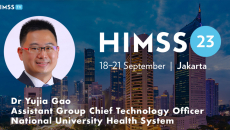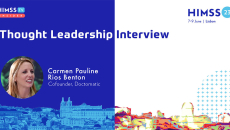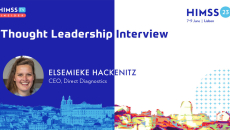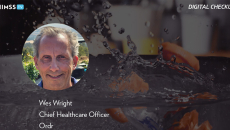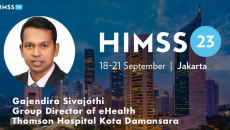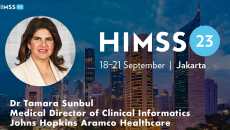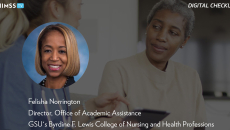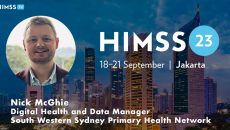Provider
Dr Yujia Gao, assistant group chief technology officer at the National University Health System, relays how mixed reality is transforming the health systems' operations, including provider workflow and surgical planning for transplants.
Carmen Pauline Rios Benton, cofounder of the HIMSS23 Europe Startup PitchFest winning company, Doctomatic, discusses how the company uses visual AI to provide a device-agnostic platform that scans and analyzes data and sends it to a doctor.
Chang Gung Memorial Hospital superintendent Dr Chien-Tzung Chen relays what challenges the health system overcame to achieve EMRAM Stage 7 and the benefit of embracing digital transformation to improve healthcare proficiency.
HIMSS23 Europe Startup PitchFest winner Direct Diagnostics' CEO Elsemieke Hackenitz says the company's preventive-healthcare solution is scaling as it shifts its focus toward a B2B model.
Health systems' cybersecurity infrastructure is only as strong as its weakest third-party vendor, says chief healthcare officer at Ordr Wes Wright, and government should fund cybersecurity because it requires systems to have a digital footprint.
Gajendira Sivajothi, group director of eHealth at Thomson Hospital Kota Damansara, Malaysia, relays the state of digital transformation in the country and the process of successfully implementing digital tools through stakeholder engagement.
Dr. Tamara Sunbul, medical director of clinical informatics at Johns Hopkins Aramco Healthcare, advises healthcare organizations on successfully shifting to an EMR, policies on data governance and potentials in healthcare globally.
Felisha Norrington, director of academic assistance at GSU’s College of Nursing and Health Professionals, relays the importance of educating students on SDOH, including the challenges of healthcare access faced by rural residents.
China Medical University Hospital won the HIMSS Davies Award for refining care delivery with AI. Professor Oscar Lee, the hospital's vice superintendent, discusses the case studies submitted for award consideration and ongoing digital growth.
Integrated Real-time Active Data has helped the South Western Sydney Primary Health Network see positive outcomes around patient consent and provider experience, says Nick McGhie, the network's digital health and data manager.
